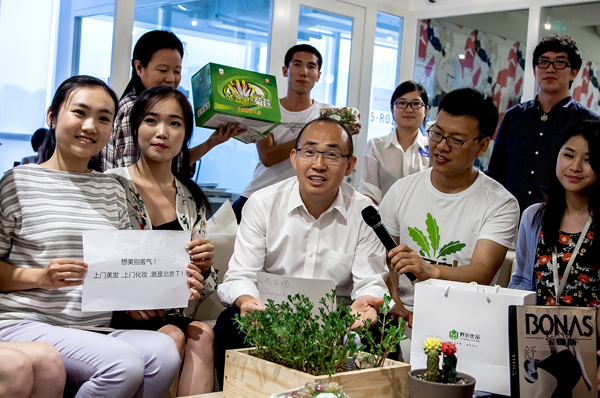 |
|
Pan Shiyi (center), chairman of SOHO China Ltd, takes a group photo with startups while visiting SOHO 3Q in Beijing. ZHANG BEI/FOR CHINA DAILY |
Company eyes extending co-working space office operations to major tier two cities
Commercial real estate development giant SOHO China Ltd, which is also the country's biggest shared office space provider, is to sell three properties in Shanghai, according to the chairman of the Hong Kong-listed company.
After an analysis of the company's 1.7 million sq m commercial property space, of which 1.2 million sq m is leasable, SOHO China has decided to offload another three property projects in Shanghai, Pan Shiyi announced on Wednesday.
On July 29, Pan put SOHO Century Plaza in Shanghai on sale for 3.3 billion yuan ($498 million). With its total 43,000 square meters of commercial space, the price per square meter is 76,700 yuan. The property alone accounts for 3.7 percent of the company's total leasable space.
The decision to adjust its portfolio by selling properties located outside core areas is in line with SOHO's strategy of holding office space in prime locations in Beijing and Shanghai, Pan said.
The internet has dramatically transformed the business world, and also brought great changes to the office market and the way people work and Pan Shiyi and his wife Zhang Xin spotted its potential. After visiting co-working spaces in the United States the couple, who jointly founded SOHO China more than a decade ago, opened shared office space provider SOHO 3Q in Beijing and Shanghai in February 2015.
The co-working space operator is mainly targeting business starters and creative companies related to the internet, for them to settle in.
To date, SOHO China has leased up to 70 percent of 13,600 seats in its 16 SOHO 3Q sites located in Beijing and Shanghai, and it aims to introduce the profit model to major second tier cities through third-party cooperation, Pan said.
"There are more than 3,000 share-office spaces in Beijing and Shanghai, with the majority being extremely small. SOHO China will expand this business mode to second-tier cities because we have an advantage in operating co-working space," Pan said.
SOHO does not own any property in cities outside Beijing and Shanghai, and also does not consider any office investment there in short term,, according to Yan Yan, president of SOHO China.
"We will launch co-working space under the 3Q brand in second tier cities through cooperating with office or commercial properties as a third party," Yan.
She added that the potential new areas of operation were Shenzhen in Guangdong province, Hangzhou in Zhejiang province, Chengdu in Sichuan province, Xi'an in Shaanxi province and Wuhan in Hubei province.
Over the past few years SOHO China has made a transition in its business strategy from "build-and-sell" to operating self-owned projects. Even though the company suffered a sharp drop in profit in 2015, it says its performance in the first half of this year has proved the success of the new strategy.
In 2015, SOHO China reported a net profit of 538 million yuan, a year-on-year drop of 86.8 percent. But in the first half of 2016, thanks to the appreciating value of its own properties and spiking rentals, it reported a net profit of about 600 million yuan, surging 344 percent from a year earlier.
"SOHO China has made a decision of shifting its business mode when other major developers still stick to traditional ways of making profit through property sales, and it is now mature enough to expand its business management to second tier cities," said Chen Sheng, president of the China Real Estate Data Academy.
"During the transformation from a property seller to a landlord, we encountered shrinking revenue as the rents generated were not comparable to the considerable sales revenue from properties, but the good news is we have made the transition, and the difficulties have bottomed out," said CEO Zhang Xin.
